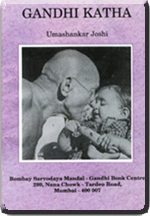
P.O. SEVAGRAM, DIST.WARDHA 442102, MS, INDIA. Phone: 91-7152-284753
FOUNDED BY MAHATMA GANDHI IN 1936

GANDHI KATHA
Written by :Umashankar Joshi
Translated by : Divya Joshi
Table of Contents
- The Miracle of Ramnama
- Equal Care For Everybody
- Motherly Love
- Oneness With Countrymen
- Universe As Family
- Playful Bapu
- The Power of Practice
- Mohan Would Not Steal
- A Lesson for School Children
- The Sportsmanship
- A Lesson Learnt From Mistake
- Its For All!
- Small Thing - Big Lesson
- Saintly Mother
- Unusual Examiner
- The First Satyagrahi
- Nothing is Unimportant
- A Confession
- The Magic of Love
- Always With The Poor
- Practical Approach
- Winning in A Loss
- The Art of Sleeping
- Punctual Bapu
- The First Lesson is Cleanliness
- Smart Kittens
- Ahimsa or Cleanliness ?
- Story Time in Jail
- Bapu - The Host
- The Making of Mahatma
- Ba - The First Satyagrahi
- Heartfelt Sympathy
- Introspective Bapu
- Unflinching Faith
- Firm on Commitment
- An Ordeal for Carelessness
- Self-Suffering
- Self Imposed Discipline
- How I Became Mahatma
- Adans Affection
- A Lesson of Cleanliness
- The Economy at Work
- The Real Friend
- True Ahimsa
- A Lesson for Detachment
- Invaluable Donation
- Anasakti Yoga
- Thinking For Others
- Great Flexibility
- Deep Compassion
- Bapu - The Strategist
- A Novel Leader
- He is Mine !
- Always On Time !
- The Wit of Bapu
- No Security Except God
- No Expensive Fruits For Me !
- The Great Statesman
- Gift For An Opponent
- Be Immortal!
About This Book
Written by :Umashankar Joshi
Translated by : Divya Joshi
First Edition : 3,000 copies, August 2010
Total : 54,000 copies
I.S.B.N :81-7229-095-0
Published by :Bombay Sarvodaya Mandal - Gandhi Book Centre
299 Nana Chowk,
Tardeo Road,
Mumbai 400 007,
MS, India
Navajivan Mudranalaya,
Ahmedabad - 380 014,
India.
Printed by :Jitendra T. Desai
Navajivan Mudranalaya,
Ahemadabad-380014 (INDIA)
© Swati Umashankar Joshi
Download
Chapter-59: Gift For An Opponent
When Gandhiji went to London to attend the Round Table Conference in 1931, all his attempts failed to convince the British statesmen. Churchill even refused to see him. At that time, General Smuts, who was considered to be ‘the wisest man of the British Empire’, had expressed his good will superbly towards Gandhiji. He invited Gandhiji to his place with lot of affection.
When General Smuts was a ruler of South Africa, Gandhiji had launched his Satyagraha movements against him and made him feel exasperated. Finally he acquired justice from him for the Indian community residing in South Africa. General Smuts, a staunch opponent of Gandhiji, became the best admirer and friend of him.
He took Gandhiji near a cupboard in his house in London, and showing him one thing, he asked, “What is this? Could you recall anything?”
Gnndhiji kept looking at it. It was a pair of shoes. He had himself made that pair of shoes and sent it as a gift to General Smuts, when he was his prisoner last time in the jail of South Africa.
When Gandhiji was in the jail in South Africa, the Government’s dealing with him was not good, despite his being a barrister and even when his behaviour was extremely polite. In the beginning he was locked up in a very narrow room. Only some light came from the ventilator above, that was all. There was no stool to sit. So, he had to stand and read. He did his labour work in jail with strict discipline. He was made to wear handcuffs while going to other places from the jail and even that he tolerated. The toilet was not convenient and the food was also a problem. Gandhiji never even desired to get any extra facilities as compared to his fellow Indian prisoners. Gradually, he also got some possible changes done.
In the beginning he too found the prison term difficult. But, he shed away that feeling. He heard his inner voice that, if General Smuts wants him to surrender by putting him in such uncomfortable condition, that was never to happen.
He had been to jail many times by 1914. When he was in the jail last time, he had prepared a pair of shoes with his on hands. After his release, he sent them as a present, through Miss Sonya Shleshin, to his ‘opponent’ General Smuts.
General Smuts later writes, “I have worn that pair of shoes during many summers, although I always felt that I do not deserve to put my feet into the shoes of such a great man.”